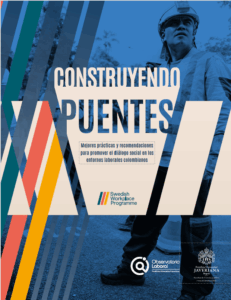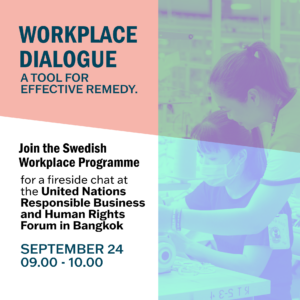Mats Svensson, just retired as International Secretary of the Swedish Industrial and Metal Workers Union, IF Metall and long-time member of the SWHAP and SWP programmes, met up with SWP’s Latin America Director, Kaveh Hagi to talk about the Swedish model, decent work and what it takes to get there.
“Companies do better when people are happy to go to work, when they are listened to and allowed to speak out without being punished. It creates greater engagement and people perform better. It’s simple logic, when we feel better – we contribute in a better way.”

The Swedish labor market model
The Swedish model permeates society because it’s based on finding common solutions regardless of your interests. We strive to find solutions that are acceptable to a majority, to reach a win-win situation. You don’t get everything, but you can get something. Doing so in a way that reduces conflicts and disruptions that are costly for everyone is at the heart of the Swedish model.
Consensus does not mean that everyone agrees, but everyone agrees that they can accept a solution that almost everyone supports.
The Swedish model is often criticized for generating many meetings, and we do have many meetings. The strength, however, is that when we have discussed an issue enough times with enough people, then everyone has been involved and understands that this is where we are going, and everyone knows what is going on. The opposite is when a few decide, but not everyone has understood, and misunderstandings and resistance arise.
To sum up, the Swedish labor market model is consensus without the need to agree.
“The opposite is when a few decide, but not everyone has understood, and misunderstandings and resistance arise.”
Conflict leads to loss – for everyone
In the beginning of the 20th century, Sweden was full of conflicts due to poor working conditions and poverty which created an imbalance on the labor market. This led to the idea, which most people agree with, that cooperation is better than conflict. Political decisions were taken to support this and legislation was developed to support the Swedish model by creating a balance of power, especially in the 1970s with the Co-determination Act (MBL). Here, employers were forced to negotiate with unions on their proposals, but there is nothing in the MBL that forces the parties to agree. In reality, it is often the employer’s line that is pushed through. But the proposal has been discussed, the views of others have been considered and often this has led to changes in the proposal – but with the same result for the company and employees.
How much does legislation matter?
There are, of course, companies that would ignore the union if legislation did not exist. But there are many companies that are pioneers and work closely with unions. Examples are foreign companies that come to Sweden and are not used to working with the union at all. But soon they realize how dialogue and cooperation benefit the company and adopt the model.
Is the Swedish labor market model applicable in other contexts?
The model is about people. It’s about values, attitudes and behavior where you respect other people regardless of origin, religion, gender etc. But when you behave badly, you don’t have to respect that. The basis is – everyone’s equal worth.
How do you build trust?
It’s a long process. The will has to be there. You need to show respect for other people’s opinions and deal with and respond to them objectively. What you say is one thing, but if you do the opposite, you can’t build trust. But if you say and do the same, then you can gradually build trust. This applies to all actors in a relationship. Time and patience are key. If you have a good working climate where you trust each other, things usually work out well.
But we must allow it to take time. Human beings are complex, and we function differently. And it is precisely this difference that we must take advantage of to enrich workplaces. But it also means taking the time to listen and get to know each other’s differences to find each other’s strengths.
If we want sustainable business, we also need sustainable relationships.
The role of the union in the workplace
The main role is to represent employees in a workplace. The individual worker is at a disadvantage vis-à-vis the manager and management in terms of access to information and mandate for decision-making. But getting together and choosing representatives who best represent you balances the relationship in the workplace. At the same time, minor issues should always be tried to be resolved at the workplace as far as possible to avoid escalation.
Trade union representatives should be able to understand the details of the business and thus deal with situations that arise together with management. This balance is useful for the company on a day-to-day basis but also in the event of a crisis. The aim is to work together to make the company profitable, leading to better conditions.
Workers, trade unions and companies have basically the same interest – they want profitable companies that can offer secure, fulfilling jobs with good working conditions in a safe environment.
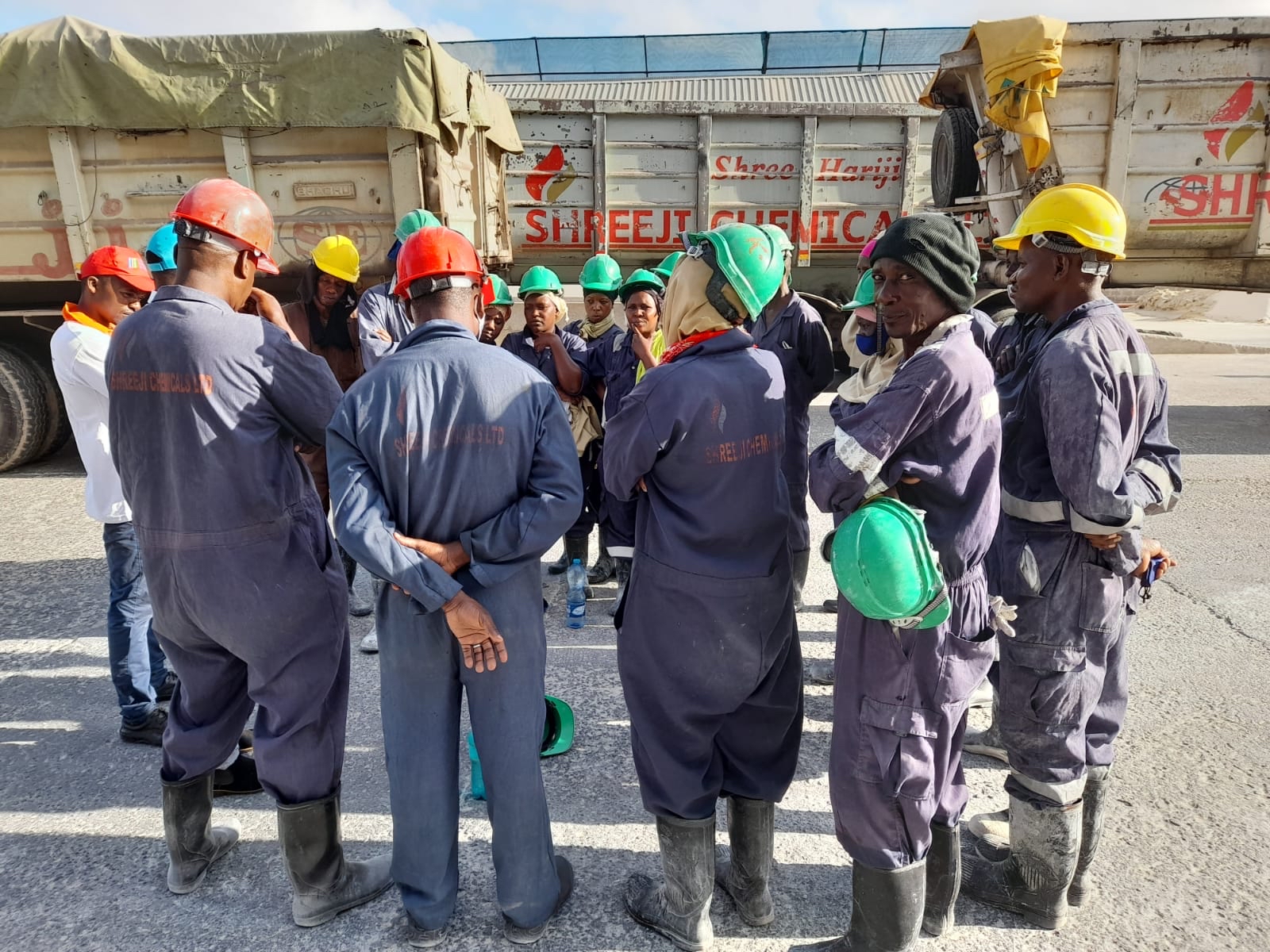
“When people get involved, it builds confidence in them to be daring. And this is where SWP is unique, by building a platform where a structure for participation is created.”
Why does decent work lead to good business?
Decent work is about decent working conditions, but also about opportunities to contribute to the company’s development. There is a clear link between how an inclusive approach to work creates the preconditions for a good working environment, and good production. When people have decent working conditions, you have a decent workplace and with that often comes a good environment. People in a workplace are not only production resources but also individuals who can contribute to the company.
….and how does SWP contribute to decent work?
SWP can demonstrate that a good company can be made even better by giving more people a say. Obviously ONE decision needs to be made but with a consultative process, this decision is shaped with the help of a wider group and perspectives. Solid structures for this dialogue to happen are needed, and the SWP contributes with this.
After completion of the SWP training, the SWP UP! shop stewards will return to their workplace and be dealt with by management in a new way. Shop stewards have a new approach, participate in the discussion with a new level of knowledge and understanding. Leveling the playing field and having the same information before a dialogue gets you further in the conversation.
When people get involved, it builds confidence in them to be daring. And this is where SWP is unique, by building a platform where a structure for participation is created.
What are the global trends in labor relations?
In general, capital owners are getting richer. Oxfam report shows that wealth distribution is moving towards concentrating wealth in a few people and families. This leads to anti-globalization movements and creates conflicts. The global labor market has become tougher while we see progress in various fields.
Global inequality and widening gaps are troubling. It is reported that globally, everyone is better off. The poor are a little better off, while the wealthy are immensely better off. A fairer distribution is needed. This requires global agreements implemented at national level, which is the only way to make big changes in a short time. It requires unity and cooperation.
Trade unions internationally need to adopt a hands-on, rather than a hands-off, approach to business. One example is in the US. Unions think they can campaign against companies one day and then sit down and negotiate with them and create something constructive. That kills trust.
Money talks
With big business comes power. The power to move jobs and operations where they make the most money. Thus, global agreements are needed. It is completely unreasonable that countries should compete with poor working conditions, tax breaks, free zones, forbidding unions and people treated only as a production utility. And should the production utility fail to deliver or obstruct, there are thousands queuing up to enter. In a poor context, a job is so desirable that entrepreneurs can cash in on people’s vulnerability.
A major challenge is the inability to comply with conventions and agreement and the unwillingness to enforce them, as well as to have monitoring mechanisms. This should be of interest to neighboring countries when the other neighbor attracts investment by not following conventions.
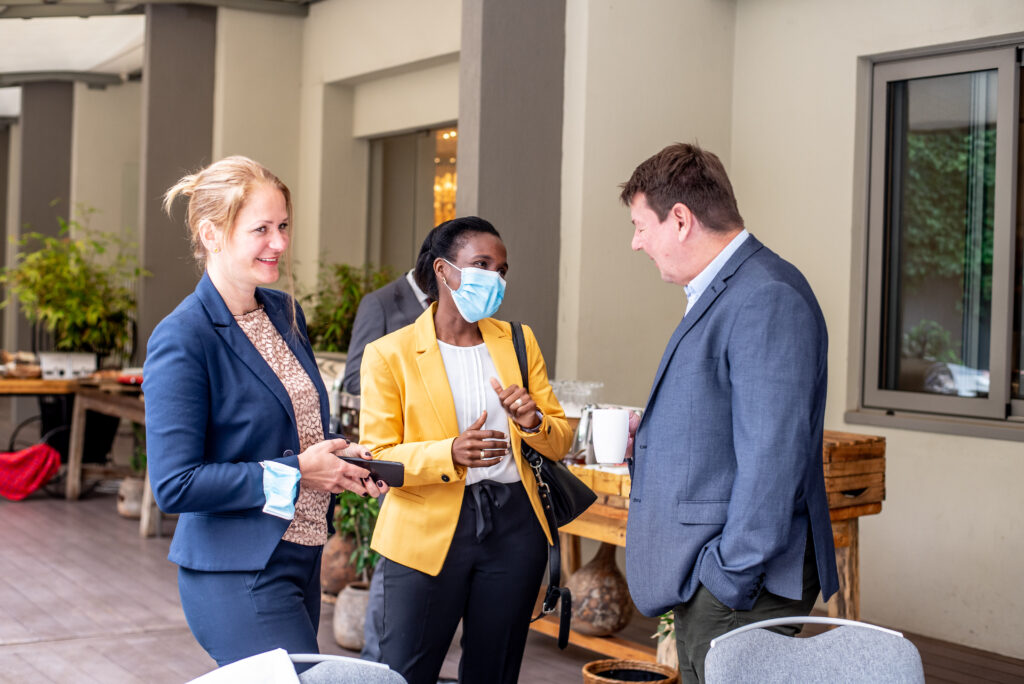
Conventions – ratified but not acting just the opposite
The problem is that there are no consequences if you fail to comply. Sanctions are a way of punishing. But if you are looking for cooperation, threats are not a good tool. It is short-sighted to be forced into cooperation with regulations and punishment as conditions.
Global framework agreements are entered into because you want to, you see the benefit in them, and you agree on the basic values. I fundamentally believe in voluntary action, commitment (between social partners) and values should be the guiding principle. It may be utopian, but I believe that democratic values increase the predictability of business.
The role of trade unions in the transition
Unions agree that climate and environmental challenges require transformation and new technologies. Old jobs are disappearing and new jobs in new sectors are being created. Here, trade unions need to embrace the transition and work on re-skilling for new jobs in new sectors.
“For me, it is imperative that unions should not fight for jobs, but for people and the opportunity to make a living that provides the conditions for a good life for themselves and their families.”
Society and companies need to support the process and people need financial security during the transition and workers need to be prepared to move, like in Sweden where jobs are being decentralized to the northern parts of the country.
Unions need to embrace technology and understand the needs of companies to be competitive in the long term. This requires monitoring the world and the capacity to fight for the possibility for people to be part of the transition.
Unions globally tend to say no and not be open to change. This leads to conflict, with members losing out. Trade unions need to show that they are part of the transformation by contributing constructively to the transformation and ensuring that there is a social perspective. The union should not constantly be a “no-saying-demand machine”. But affirmative, engage in dialogue and be open to working with employers to find good future solutions for employees.
Metall trade union is a feminist union – what does that mean?
We believe in the equal value of all people. We see globally that women have the hardest time making a career, the hardest time getting skills development, have the lowest wages despite comparable jobs, taking care of household and children, having social contacts with school – women simply do not have the same opportunities as men. Thus, there is a need to focus on a more equal working life between men and women where everyone, regardless of gender, has the same opportunities.
In many countries, women are more likely to be well educated, but the top jobs in politics and business are held by men, which is a structural problem. Men see themselves above women, always, whatever the circumstances.
As a trade union, If Metall is working on improving structures, values, and behaviors and that takes time. We have explicit targets for the number of women in the decision-making bodies of unions and some progress has been made, but it is slow, too slow.
